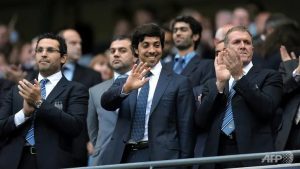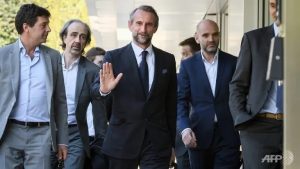Manchester City’s legal victory at the Court of Arbitration for Sports on Monday may be its most important one yet, says John Duerden.

Manchester City’s two-season ban from European competitions was lifted on Monday
SINGAPORE: Monday (Jul 13) may have seen the most significant football result of the season but while Union of European Football Associations’ (UEFA) Financial Fair Play (FFP) rules may have suffered a clear defeat, the current coronavirus crisis shows that some form of financial regulation in football is necessary.
Manchester City’s win did not come on the pitch but from the website of the Swiss-based Court of Arbitration for Sports (CAS) announcing that it had overturned the UEFA severe punishment of a two-year Champions League ban on the English Premier League (EPL) club.
The ramifications of this decision, which came after an appeal from the team, remain to be seen but are already being debated.
If the reaction of the president of Spain’s La Liga is anything to go by, it may be a heated one. “We will have to reassess whether the CAS is the appropriate body to which to appeal institutional decisions in football,” Javier Tebas wrote on his Twitter account on Monday.
CITY RUNNING FOUL OF THE FFP
UEFA is the governing body of football in Europe and in February ruled that City, which was taken over in 2008 by Abu Dhabi United Group – a private equity company owned by UAE royal Sheikh Mansour bin Zayed Al Nahyan – had breached its Financial Fair Play (FFP) rules.
These rules were drawn up by UEFA in 2010 and linked the spending of clubs that qualified for European competitions with their revenues.

Sheikh Mansour, on a rare visit to a Manchester City game in 2010, has underwritten a huge investment in the club
Limits were put on losses, monitored over a three year period, and it was all designed, according to the organisation, to instill financial responsibility.
Michel Platini, UEFA president at that time, rallied against “financial doping” that was in danger of ruining the balance of football and risked creating unsustainable levels of debt.
Clubs like Manchester City, whose new owners splashed out US$1.89 billion on players in their first decade in charge – transfer fees and wages are included in the FFP but investments in stadiums, youth development, community projects and facilities are not – fell foul of the rules.
The club was fined US$86 million in 2014 for recording excessive combined losses of more than US$200 million over the two prior seasons as they expanded their squad with many high-cost signings. This exceeded the US$51 million maximum deficit allowed by UEFA.
UEFA had accused the EPL club of withholding financial accounts and impeding its investigations in 2014, leading to the recently concluded case.
City weren’t the only team taken to task that year as six other European clubs were also brought to task by UEFA. For instance, French club Paris St Germain, taken over by Qatar Sports Investments in 2011, were fined US$95 million in the same year under the FFP for recording significant losses as well.
IMPLICATIONS OF THE VERDICT
Supporters of these big-spending clubs have claimed that the rules were set up to safeguard the traditional elite of European football.

Jean-Claude Blanc (C) leads the PSG delegation at UEFA’s headquarters, where the French club were pleading their case in a Financial Fair Play (FFP) hearing on Friday
After decades at the top of the game, giants such as AC Milan, Manchester United, Bayern Munich, Real Madrid, Liverpool, Juventus and others, had global fan bases, huge stadiums and major sponsorship appeal and were able to rake in significant revenue levels.
If owners of smaller clubs and emerging powers are not allowed to invest the necessary funds, it can be difficult to challenge for top honours.
“[FFP] is intended to cement a handful of elite clubs in place and shut the rest outside, unable to grow, to present a sustained challenge, even if they want to or are successful,” wrote English journalist Martin Samuel in the Daily Mail in February.
Upon receiving the two-year ban, City were resolved to fight and the club assembled an expensive team of lawyers to mount a case and argue it at CAS. It seemed to work although the exact details of City’s legal defence are unknown yet.
In the short-term football future, CAS’ ruling means that City will not have to deal with exclusion from the UEFA Champions League for two years. That would have been a severe blow in terms of finance – a loss of around US$300 million would be tough even for Abu Dhabi to swallow – but also for football.
The club was bracing itself to lose star players such as Raheem Sterling and Kevin De Bruyne who were unlikely to accept being absent from the elite competition for two seasons even if world-leading coach Pep Guardiola had stayed at the helm.
The decision is humiliating for UEFA.
“The credibility of Financial Fair Play (FFP) lies in tatters,” said Dan Roan of the BBC. “After all, how can FFP survive after one of the world’s richest clubs…walk away with just a 10 million euros (US$11.4 million) fine? Many will wonder what kind of deterrent that sets for other clubs.”
THE FFP HAS ALREADY PROVEN ITS WORTH
But with coronavirus causing havoc in football, FFP has already made a difference.
When the rules came into effect in 2011, over 700 clubs in the top tiers of 54 European leagues had collectively lost US$5.6 billion over the previous three years. In January 2020, UEFA reported that the same clubs were, by 2018, recording profits of US$159 million.
Thanks to the influence of FFP, European football clubs are, overall, in a much healthier state to deal with the effects of coronavirus than they could have been.
The outbreak brought the game to a halt around the world. European leagues such as France decided to cancel the season while the EPL finally finishes on Jul 26 after a two-month suspension.
With stadiums currently empty, clubs have lost ticket and hospitality revenues and it remains to be seen if broadcasting income maintains its current level. There is still uncertainty as to whether the next season will also be affected but it is likely that there will be less money in the game.
Given the current global economic slowdown, there is less likely to be an appetite for the usual end-season mega transfers of players.
Clubs like current English, European and world champions Liverpool are preparing to stick with the players they have, for now at least, according to manager Juergen Klopp.
“This is a difficult year for all football clubs in the world and I don’t think it’s a time where we talk about transfers like the rest around us did not happen,” said Klopp.
A quiet transfer period seems to make sense but in the debate as to whether FFP can survive Monday’s decision, there should be a recognition that without it, the current crisis in football could be a lot worse as many clubs could have been under financial duress and some may even have had to fold or go into restructuring.
In that regard, FFP has already proven its worth as it has saved football – its ultimate aim.
John Duerden has lived in Asia for 20 years and covers the region’s sporting scene. He is the author of three books including Lions & Tigers – The History of Football in Singapore and Malaysia (2017).

